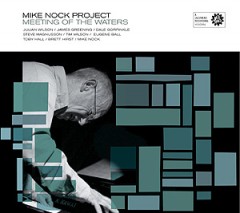 Looking back pianist and composer Mike Nock describes himself as a “bit of a wild kid.” At the age of 16 he pawned his saxophone and travelled from his New Zealand hometown of Nguarawahia to Wellington. Once there, he played piano in a Maori/Pakeha group called “The Fabulous Flamingoes.”
Looking back pianist and composer Mike Nock describes himself as a “bit of a wild kid.” At the age of 16 he pawned his saxophone and travelled from his New Zealand hometown of Nguarawahia to Wellington. Once there, he played piano in a Maori/Pakeha group called “The Fabulous Flamingoes.”
It was 1956, and a new pop music called rock ‘n’ roll was everywhere, exploding across all charts. Nock says their band, nurturing jazz ambitions, moved from Hawaiian songs to playing something “that sounded like a cross between Elvis Presley and the Nat King Cole trio.” He also played ragtime solos in the band, drawing on earlier piano lessons from his father and a period when he was mostly self-taught. He recalls the band being so poor that they lived in camping grounds and occasionally were reduced to raiding neighbourhood gardens for vegetables. Over half a century and more than one hundred recordings later, Mike Nock’s lifetime dedication and outstanding contribution to contemporary music is being formally recognized. Last month, at an awards ceremony in Melbourne hosted by Deputy Prime Minister Julia Gillard, the pianist was inducted into the prestigious Graeme Bell Awards Hall of Fame, named after its 2003 inaugural member, pianist Graeme Bell AO. By being inducted, Nock joins six other outstanding veteran practitioners of Australian jazz: saxophonist Bernie McGann; saxophonist Don Burrows; drummer John Pochee; drummer Allan Browne; clarinettist Ade Monsbourgh; and pianist Graeme Bell.
In 1958 the 18-year-old Nock had travelled to Australia and was performing in Sydney where he recorded two albums with his highly regarded Three Out Trio. Two years later he toured the UK with this trio, and in 1961 Nock, determined to have a shot at the big time, arrived in New York where he had the opportunity to hear many jazz legends: Ornette Coleman, Miles Davis, Wynton Kelly among others. That same year he won a music scholarship to study at Berklee College in Boston and turned twenty one in September. By night he was house pianist at a Boston club accompanying many jazz greats including Coleman Hawkins, Pee Wee Russell, and Sam Rivers. He encountered racism in the American south touring for three years from 1964 with an otherwise all-black band led by saxophonist Yusef Lateef, when the band’s vehicle was once run off the road and on several occasions Nock, the only white member, was obliged to stay out of sight by hiding on the floor.
The Rhodes electric keyboard appeared in 1965 and Nock took to it enthusiastically: “It was just the sort of instrument I was looking for,” he says.
He put together a ground-breaking jazz rock fusion quartet – one of the first of its kind – called Fourth Way using electric piano, bass, drums and the exploratory violinist Michael White who’d played with such icons as John Coltrane and Sun Ra. In 1968 Fourth Way toured the UK and Europe, appearing at the influential Montreux Jazz Festival in 1970 and recording several albums. The group was well ahead of its time, experimenting with unorthodox sounds: African thumb piano, recorder and strummed piano chords. It was too much for some; one US critic termed the music “too abstract.” Fourth Way disbanded in 1971 and Nock gigged around including a stint with the stellar Jazz Messengers, eventually moving to San Francisco where he played with renowned altoist John Handy and others.
He became a studio musician in New York from 1975 until 1985 when he decided to return to Australia taking up a teaching offer at the Brisbane Conservatorium. After one year in Brisbane Nock was invited by Don Burrows to move to the Sydney Conservatorium, where he still teaches two days a week. During the late eighties he also took a belated masters degree in music at the ANU.
Nock recalls that apart from the job offer he had other reasons for returning to Australia: he had always maintained ties and friendships here and in New Zealand, he disliked the Reaganism of the US in 1985 and its problems with Iran, and adds “I’m happy here. I have a sense of belonging whereas in the US I felt I was just another person in the crowd.” However the question about achieving greater success had he remained overseas prompts a decisive response: “Oh, there’s no doubt about it. I would have far more international recognition now if I’d stayed abroad.” He’s philosophical though about things that might have been, seeing himself as an artist, subject to all of the highs and lows that title brings. Nevertheless it’s interesting to speculate about whether the name Mike Nock might have been aligned with his pianistic contemporaries such as Keith Jarrett or McCoy Tyner. Certainly he has the talent and potential for such a comparison.
Despite prodigious composing and performing, (his trio was support act for legendary saxophonist Sonny Rollins at the Sydney Opera House in 2008) recording, winning accolades including an Aria award for a 2007 CD, and leading many different groups in the jazz idiom, Nock’s work also extends into the classical genre. Australian pianist Michael Kieran Harvey has recorded an album of Nock’s compositions, a collection of his contemporary piano music has been published, his classical works have been performed by orchestras internationally, and a new, twenty minute piano duet of his will debut at a New Zealand Festival next month.
A biography of Mike Nock is due for publication next year to coincide with the artist’s seventieth birthday. It’s to be titled “A Balanced Life,” but with characteristic self-deprecating humour Nock comments: “That should be changed to unbalanced.”
——————————
This article first appeared in a slightly different form in The Australian and is republished with permission.














